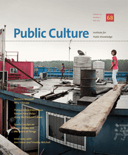
PUBLIC CULTURE
Scope & Guideline
Challenging Conventions, Inspiring Dialogue.
Introduction
Aims and Scopes
- Cultural Critique and Theory:
The journal emphasizes critical analysis of cultural texts and practices, examining their implications on social and political contexts. - Interdisciplinary Approaches:
It adopts methodologies from various disciplines including sociology, anthropology, media studies, and cultural studies to provide a comprehensive understanding of public culture. - Global Perspectives:
Public Culture engages with global issues and diverse cultural contexts, highlighting voices and narratives from marginalized communities. - Political Engagement:
The journal explores the role of culture in political movements and social change, investigating how cultural expressions can mobilize communities. - Thematic Exploration of Contemporary Issues:
It consistently addresses pressing contemporary issues such as climate change, technology, and social justice through a cultural lens.
Trending and Emerging
- Climate Change and Environmental Politics:
The journal has seen an increase in articles discussing the cultural implications of climate change, exploring how narratives and practices shape environmental activism. - Digital Culture and Technology:
There is a rising focus on the intersection of culture and technology, particularly how digital platforms influence social interactions and political movements. - Postcolonial and Decolonial Studies:
Emerging themes in postcolonial critiques highlight the complexities of identity, race, and power dynamics in contemporary society, reflecting an important shift towards decolonial perspectives. - Health and Crisis Narratives:
The impact of global health crises, such as the COVID-19 pandemic, on cultural practices and societal norms has become a significant area of exploration, revealing the interplay between culture and public health. - Affective Politics and Emotional Labor:
There is an increasing interest in how emotions shape political engagement and cultural production, emphasizing the role of affect in public life.
Declining or Waning
- Traditional Media Studies:
There is a noticeable decline in papers focusing solely on traditional media forms, as the journal increasingly emphasizes new media and digital culture. - Narrowly Defined Cultural Studies:
Research with a narrow focus on specific cultural phenomena without broader socio-political implications has become less frequent, reflecting a shift towards more integrative and critical studies. - Static Cultural Heritage:
Themes centered around static concepts of cultural heritage have waned, as the journal pivots towards dynamic and evolving cultural practices and their impacts. - Eurocentric Perspectives:
The focus on Eurocentric cultural narratives has diminished, giving way to more diverse and inclusive representations of culture from non-Western contexts.
Similar Journals

TEXTUAL PRACTICE
Transforming Perspectives on Literature and TheoryTEXTUAL PRACTICE, published by Routledge Journals, Taylor & Francis Ltd, stands as a leading peer-reviewed journal in the field of Literature and Literary Theory, contributing significantly to scholarly dialogue since its inception in 1987. With an impressive 2023 Scopus ranking placing it in the top 88th percentile, the journal holds a coveted Q1 category designation, underscoring its impact and relevance in contemporary literary studies. While it operates under a traditional access model, TEXTUAL PRACTICE continues to foster a vibrant platform for academics, offering in-depth analyses, innovative research, and critical discourse that shape the understanding of texts and their cultural implications. Situated in the United Kingdom, this journal is pivotal for researchers, professionals, and students committed to exploring the multifaceted dimensions of literature and its theories, thereby enhancing the intellectual landscape of the humanities.
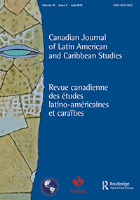
Canadian Journal American and Caribbean Studies
Exploring the Dynamics of American and Caribbean Relations.Welcome to the Canadian Journal of American and Caribbean Studies, a pivotal platform for researchers, professionals, and students interested in the intricate relationships and dynamics of the American and Caribbean regions. Published by Routledge Journals, Taylor & Francis Ltd., this journal presents a rich tapestry of scholarly articles that explore various dimensions of political, geographical, and developmental studies. With a history spanning from 1984 to 2011 and resuming in 2014 through 2024, it continues to contribute to the field's scholarly discourse. The journal currently ranks in the Q4 quartile for Development and Geography, Planning and Development, and Q3 for Political Science and International Relations, underscoring its emerging relevance within these domains. While it is not open access, the journal provides a vital resource for advancing research and fostering academic dialogue among its audience. Explore cutting-edge insights and critical analyses that reflect the evolving landscapes of American and Caribbean studies.
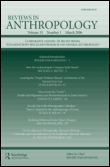
Reviews in Anthropology
Exploring the Depths of Cultural DiscourseReviews in Anthropology, published by Routledge Journals, Taylor & Francis Ltd, is a vital academic journal for scholars and practitioners in the fields of anthropology and cultural studies. With a history extending from 1974 to 2024, this journal reflects the evolving discourse within the social sciences, offering a collection of insightful reviews and critiques that shape contemporary anthropological thought. Although it operates under a non-open access model, its impact is underscored by its positioning in the Q3 quartile for both Anthropology and Cultural Studies, as well as respectable Scopus rankings. This journal serves as a platform for disseminating influential research, fostering academic dialogue, and enhancing understanding of diverse cultures and societies. Its robust editorial board and commitment to quality scholarship make it an essential resource for researchers, professionals, and students looking to deepen their knowledge and contribute to the ever-changing landscape of anthropology.
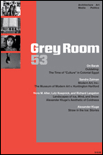
Grey Room
Unveiling Cultural Narratives Through Built EnvironmentsGrey Room is a distinguished peer-reviewed academic journal published by MIT Press, focusing on interdisciplinary discussions at the intersection of architecture, communication, sociology, political science, and the visual and performing arts. Established in 2002, the journal has carved out a critical space for exploring the links between built environments and cultural narratives, engaging a diverse readership of researchers, professionals, and students. With an impact factor reflecting its contribution to these fields, it is recognized for fostering innovative dialogue and scholarship. Although it operates without an open access model, Grey Room continues to thrive in the academic community, particularly as it moves towards converged years spanning from 2002 to 2024. The journal's categorization into various quartiles highlights its relevance and ongoing commitment to contemporary issues. Readers can expect thought-provoking articles that challenge conventional boundaries of practice and scholarship, making Grey Room an essential resource for those interested in the dynamic interplay of architecture and culture.

PAJ-A JOURNAL OF PERFORMANCE AND ART
Exploring the Boundaries of Performance and ArtPAJ: A Journal of Performance and Art is an esteemed publication dedicated to exploring the dynamic intersections of performance, visual arts, and music. Published by MIT Press, this journal serves as a crucial platform for scholars, practitioners, and students alike to engage with contemporary discourses in the arts. With a converged publication timeline from 2002 to 2024, PAJ is committed to advancing knowledge and fostering critical dialogue within its fields. Although it is currently not open access, the journal maintains a respectable standing, having been rated in the Q4 category for Music and Q3 category for Visual Arts and Performing Arts in 2023. With an emphasis on innovative and interdisciplinary approaches, PAJ is vital for those looking to understand and contribute to the evolving landscape of performance and art in today’s society. Its unique contributions enable it to carve a niche for itself amidst the vibrant tapestry of arts scholarship.

Middle East Journal of Culture and Communication
Advancing Understanding of Communication PathwaysMiddle East Journal of Culture and Communication is a vital scholarly platform published by BRILL, dedicated to fostering an understanding of cultural dynamics and communication pathways within the Middle East. Established in 2008, this journal delivers a rich array of interdisciplinary research spanning the fields of Arts and Humanities, Communication, Cultural Studies, Political Science, and Sociology. With an impact factor reflective of its commitment to high-quality scholarship, it currently ranks in various quartiles, including Q3 in Arts and Humanities (miscellaneous) and Q4 in Communication and Political Science, demonstrating its importance in the academic discourse surrounding these disciplines. The journal's open access policy ensures that critical insights and analyses are widely disseminated, catering to a global audience of researchers, professionals, and students alike. The Middle East Journal of Culture and Communication stands as an essential resource for those seeking to explore the intricate tapestry of cultural interactions in the region through rigorous academic inquiry.
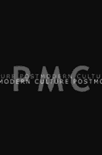
POSTMODERN CULTURE
Innovating Perspectives on Art and LiteraturePOSTMODERN CULTURE, published by Johns Hopkins University Press, is a pivotal journal in the fields of Cultural Studies, Literature and Literary Theory, and the Visual Arts and Performing Arts. With a focus on the nuances of postmodern theory and its interdisciplinary applications, the journal has established itself as an essential resource for researchers and scholars seeking to explore contemporary cultural phenomena through innovative critical lenses. Compiling works from 2002 to 2023, it is indexed with notable rankings, including Q2 in Literature and Literary Theory and Q3 in Cultural Studies, reflecting its significant contribution to persistent academic discourse. While not open access, the journal ensures that access to groundbreaking research is available to libraries and institutions, reinforcing its importance in the scholarly community. POSTMODERN CULTURE serves not only as a repository of academic inquiry but also as a catalyst for new ideas, stimulating dialogue among professionals and students alike in understanding the complexities of today's cultural landscape.

Environmental Humanities
Integrating Humanities and Ecology for a Sustainable FutureEnvironmental Humanities, published by DUKE UNIVERSITY PRESS, is a premier journal that has established itself as a leading platform for interdisciplinary scholarship at the intersection of the environment and the humanities. With its open access framework since 2012, the journal fosters widespread dissemination of critical research that integrates perspectives from Anthropology, Ecology, and the Social Sciences. Currently holding impressive Q1 rankings in both Anthropology and Social Sciences for 2023, along with notable Q2 standings in Environmental Science fields, this journal provides a vital forum for innovative explorations of how human culture shapes and is shaped by environmental challenges. Situated in the United States, the journal encourages authors and thinkers to contribute to ongoing discussions about sustainability, ethics, and the cultural dimensions of environmental issues, making it an essential resource for researchers, professionals, and students alike. With a commitment to high-quality scholarship, Environmental Humanities plays a crucial role in advancing knowledge and understanding in a rapidly evolving field.
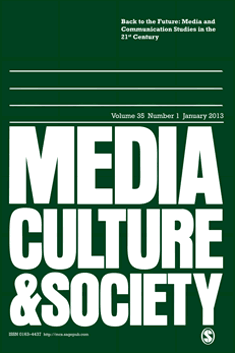
MEDIA CULTURE & SOCIETY
Exploring the Intersections of Media and Cultural DynamicsMEDIA CULTURE & SOCIETY, published by SAGE PUBLICATIONS LTD, is a prominent academic journal dedicated to the interdisciplinary exploration of media, culture, and societal dynamics. With a long-standing history since its inception in 1979 and extending to 2024, this journal serves as a vital platform for researchers, professionals, and students interested in understanding the complex interplay between media and cultural phenomena. Operating from the United Kingdom, it holds a prestigious Q1 ranking in both communication and sociology/political science categories, reflecting its significant impact within these fields. The journal’s Scopus ranks further attest to its excellence, placing it in the top percentiles and making it an essential resource for advancing scholarly discussions. While not open access, MEDIA CULTURE & SOCIETY continues to provide insightful analyses that shape contemporary discourse on the role of media in society, ensuring its relevance and importance to academic communities worldwide.
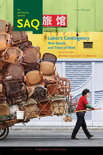
SOUTH ATLANTIC QUARTERLY
Chronicling Intellectual Rigor in Cultural StudiesSOUTH ATLANTIC QUARTERLY, published by DUKE UNIVERSITY PRESS, stands as a pivotal journal within the fields of Cultural Studies, Literature and Literary Theory, and Sociology and Political Science. With its rich historical foundation dating back to its inception in 1907, the journal has continuously provided a platform for rigorous scholarship and critical discourse. It has consistently achieved remarkable rankings, holding a distinguished place in the Q1 category across its relevant fields as of 2023, demonstrating its significant impact with Scopus rankings positioning it in the top percentiles. Though not an open-access journal, it offers a valuable repository of interdisciplinary insights that appeal to researchers, professionals, and students alike. The South Atlantic Quarterly remains essential for anyone looking to engage deeply with contemporary and historical issues spanning a broad spectrum of cultural and societal contexts, particularly through its insightful articles and critical reviews published biannually. Explore the multifaceted dimensions of the humanities and social sciences with this renowned journal, renowned for its commitment to intellectual rigor and innovative scholarship.